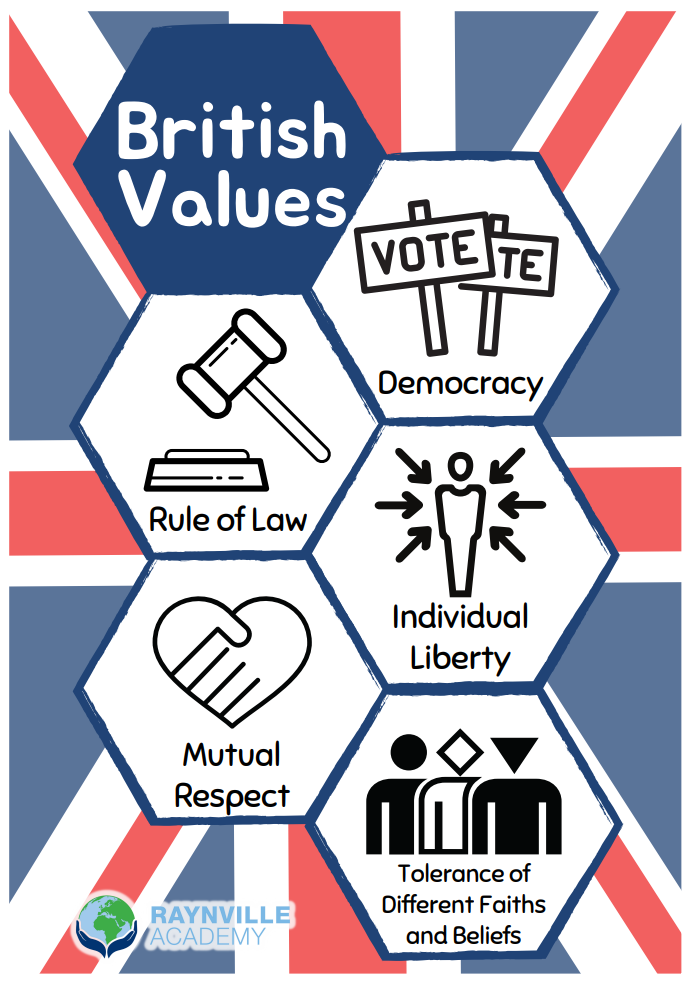British Values Statement

At RA we ensure that through our vision, values, rules, curriculum and teaching we promote tolerance and respect for all cultures, faiths and lifestyles. We have a duty to prepare our children for life in modern Britain and to keep them safe. As an academy we value the diverse ethnic backgrounds of all pupils and families; we undertake a variety of events and lessons to celebrate these. We have found this approach to be enriching for all parties as it teaches tolerance and respect for the differences in our community and the wider world.
This statement outlines the key British values we actively promote.
General overview
RA is committed to serving its community and surrounding areas. We recognise the multi-cultural, multi-faith nature of the United Kingdom and understand the crucial role our academy plays in promoting these values.
Through our provision we:
– enable students to develop their self-knowledge, self-esteem and self-confidence;
– enable students to distinguish right from wrong
– encourage students to accept responsibility for their behaviour, show initiative, and to understand how they can contribute positively to the lives of those living and working in the locality of the school and to society more widely;
– further tolerance and harmony between different cultural traditions by enabling students to acquire an appreciation of and respect for their own and other cultures;
– encourage respect for other people; and
– encourage respect for democracy and support for participation in the democratic processes, including respect for the basis on which the law is made and applied in England
– promote an understanding of how citizens can influence decision-making through the democratic process;
– teach an understanding that the freedom to choose and hold other faiths and beliefs is protected in law;
– encourage acceptance that other people having different faiths or beliefs to oneself (or having none) should be accepted and tolerated, and should not be the cause of prejudicial or discriminatory behaviour; and teach an understanding of the importance of identifying and combatting discrimination.
Democracy
To understand how they can influence decision making through a democratic process.
We empower our pupils by giving them opportunities to make choices about the things that they believe to be important. By valuing each ‘voice’ and by listening and responding to that voice we demonstrate that we support democracy and liberty
Pupils also have the opportunity to have their voices heard through our Pupil Council and pupil questionnaires. The elections of Pupil Council Members are based solely on pupil votes.
The School Council itself is led by a member of staff and adheres to democratic processes.
The principle of democracy is also explored in the History and RE curriculum as well as in assemblies.
The Rule of Law
To appreciate that living under the rule of law protects us and is essential for our wellbeing and safety.
The importance of laws, whether they be those that govern the class, the academy, or the country, are consistently reinforced throughout regular school days; when dealing with behaviour and through school assemblies.
Pupils are taught the value and reasons behind laws; that they govern and protect us; the responsibilities that they hold and the consequences when laws are broken. Visits from authorities such as the Police; Fire Service; Ambulance etc. are regular parts of our calendar and help reinforce this message.
We have a clearly structured behaviour policy which all staff understand and follow.
The concept of the Rule of Law is also reinforced through teaching activities in our citizenship curriculum.
Individual Liberty
To understand that the freedom to choose is protected in law.
Pupils are actively encouraged to make choices, knowing that they are in a safe and supportive environment.
Pupils have key roles and responsibilities in school e.g, Mindmate Ambassadors, class rep’s, play leaders etc.
We educate and provide boundaries for pupils to make choices safely, through provision of a safe environment and an empowering education.
Pupils are encouraged to know, understand and exercise their rights and personal freedoms and advise how to exercise these safely, for example through our E-Safety and PSHE lessons.
Whether it is through choice of challenge, of how they record, of participation in extra-curricular clubs and opportunities etc, pupils are given the freedom to make choices.
Mutual Respect
To understand that while people may hold different views, we may show respect towards them.
Part of our behaviour policy revolves around core values such as ‘Respect’. Pupils have been part of discussions and assemblies related to what this means and how it is shown. These ideas are reiterated through the school rules. Circle time rules emphasise the ‘safe space’ to give opinions and share ideas.
Our PSHE curriculum embodies values of Mutual Respect through units of learning such as ‘What makes a community’ and ‘How can our choices make a difference’.
Through PE, we promote an attitude of equality and fairness.
On a general level, empathy, respect and tolerance are also taught within PSHE, Citizenship and RE lessons and on an informal nature throughout the school days.
Tolerance of those of Different Faiths and Beliefs
To accept that others have different faiths or beliefs (or none) and these should be accepted and tolerated.
This is achieved through enhancing pupils understanding of their place in a culturally diverse society and by giving them opportunities to experience such diversity.
Assemblies and discussions involving prejudices and prejudice-based bullying are regularly held.
We follow the Leeds agreed syllabus for RE which provides a broad and balanced education on a range of faiths, religions and cultures.
At Raynville we will actively challenge pupils, staff or parents expressing opinions contrary to fundamental British Values, including ‘extremist views’.

